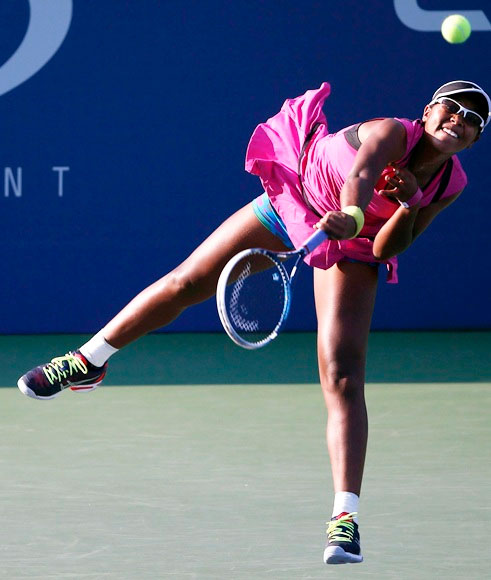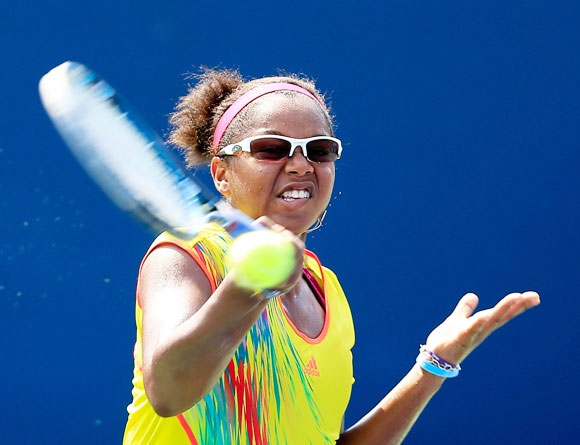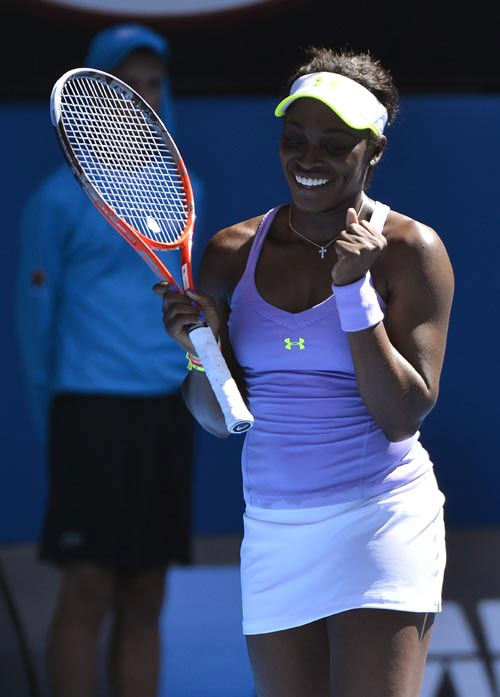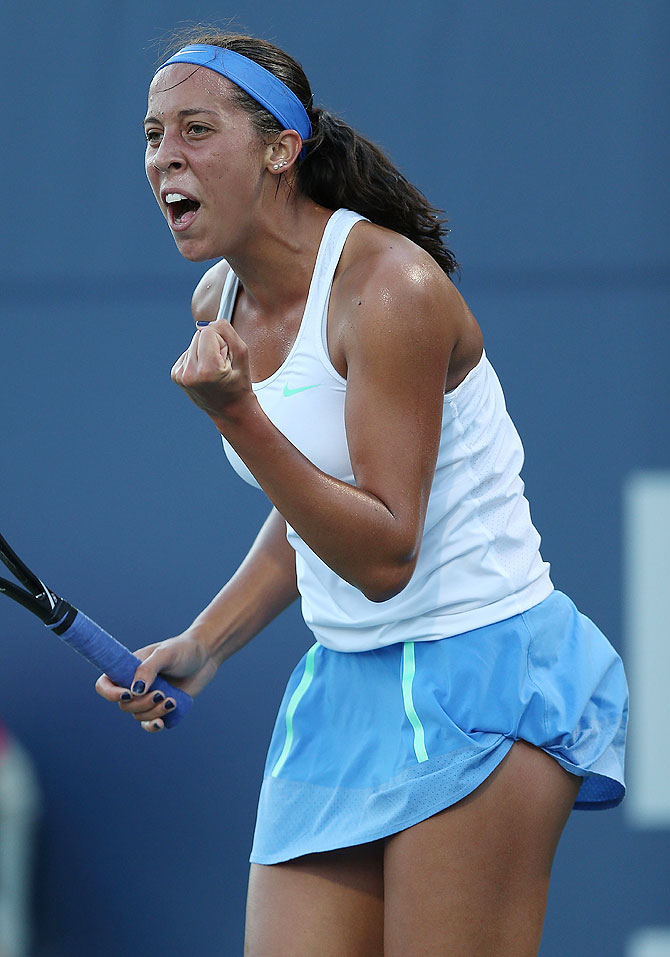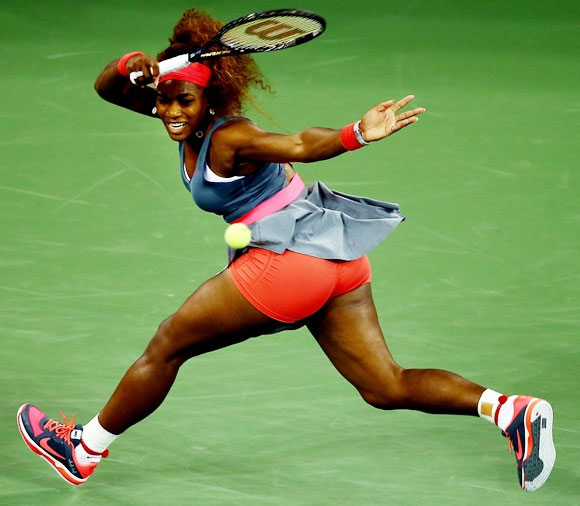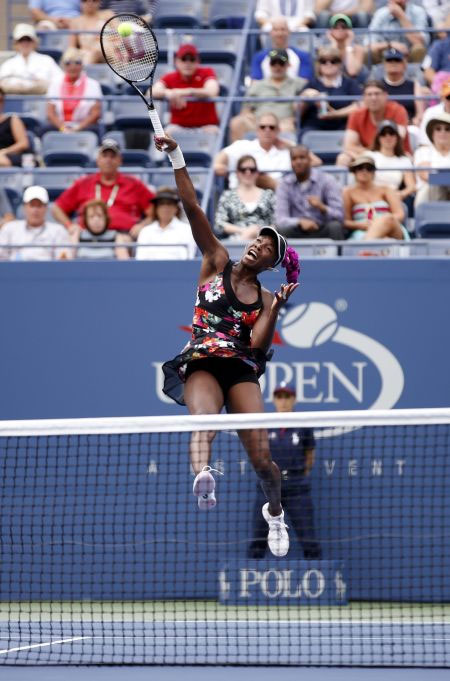 | « Back to article | Print this article |
How the Williams sisters influence emerging tennis talent from US
The legacy of the championship years of the Williams sisters is beginning to emerge, with 10 American women now ranked in the top 100 and members of the younger set beginning to knock on the door of Grand Slam success.
Tennis great Chris Evert sees major hardware within reach, while U.S. Tennis Association chief of player development Patrick McEnroe and U.S. Fed Cup captain Mary Joe Fernandez agree that U.S. women's tennis is once again very much on the rise.
On Friday, 20-year-old Sloane Stephens beat Jamie Hampton in a third-round U.S. Open clash between Fed Cup team mates that put a spotlight on American talent bursting to prominence.
"The ceiling is high. This is a great group, starting with Sloane, who has had the most success," McEnroe, the former U.S. Davis Cup captain, told Reuters at Flushing Meadows.
Stephens won international attention this year with a quarter-final upset of Serena at the Australia Open and followed that with a run to the quarter-finals at Wimbledon.
How the Williams sisters influence emerging tennis talent from US
Earlier this week, 17-year-old Victoria Duval shocked 2011 U.S. Open champion Samantha Stosur in a first-round upset, while the likes of Madison Keys and Sachia Vickery are also showing promise.
"What I'm really pleased about is not only do we have girls right behind Sloane like Keys and Sachia and Vickie Duval, but we have girls behind them," said McEnroe.
Evert, who like McEnroe and Fernandez is part of the ESPN broadcast team at the year's final Grand Slam, called the group "very promising".
"It is very encouraging to American tennis," she told Reuters.
"This generation is emerging. In two years time we can see four or five young Americans in the top 20."
'Stephens has got the complete package'
Evert, who won 18 Grand Slam singles titles, did not stop there, predicting major success around the corner.
"I think Sloane can win a major in a few years. I think Madison Keys could win a major," she added.
"It's not like, 'oh they're nice players, they can make the top 20'. These young players have weapons. They are winning points, not waiting to lose points from the veterans. They are being aggressive, which I like."
Fernandez, the U.S. Fed Cup captain, also ranked Stephens as the leader of the pack -- for now.
"She's shown how tough she is under pressure, especially at the majors," Fernandez told Reuters.
"She beat Serena and Maria (Sharapova) this year. She's got the complete package.
"She's got the speed, got the power. She comes forward well, when she wants to. She still has a lot of room to improve."
'It's not just African Americans; the influence is starting to show'
Fernandez cautioned about short-changing 18-year-old Keys.
"Madison Keys seems to have a ton of potential because she's powerful, has a huge serve, really belts the ball from the ground. She needs to get quicker."
McEnroe said the sheer number of emerging talents was what gave him such optimism for the future.
"I don't know if you can create a Grand Slam champion, but if you get the numbers then you have that group effect and you have a better chance that the extraordinary ones will get to the top," he said.
All three agreed that the current rise of U.S. women was tied to the impact made by Serena and Venus Williams, who have won a total of 23 Grand Slam singles titles between them.
"Seeing them dominating and the great lives they are having and the champions that they are, that inspires them to develop their game even more," said Evert, pointing to the African American girls among the crop like Stephens, Keys, Duval, Taylor Townsend and Sachia Vickery.
"And it's not just African Americans. The influence is starting to show."
'This generation has been inspired by the Williams sisters'
McEnroe said there was no doubting the influence of the Williams sisters.
"We see a lot more diversity in girls' tennis than in boys. We need to work on that on the men's side," he said.
"Absolutely seeing that this generation has been inspired by them."
The Williams sisters followed a chain of U.S. champions stretching from Evert to naturalised Americans Martina Navratilova and Monica Seles.
But the possible successors to 31-year-old Serena and 33-year-old Venus have only just recently emerged.
The last American women not named Williams to enjoy success at the four Grand Slam tournaments respectively were Lindsay Davenport (1998 U.S. Open and 1999 Wimbledon) and Jennifer Capriati (2001 French Open and 2002 Australian Open).
This new crop of talent grew up watching the Williams sisters. Serena won her first slam at the 1999 U.S. Open and Venus followed the next year at Wimbledon.
'I love seeing young girls come through'
"They've been great role models on many levels," said Fernandez. "We're finally getting to see the young ones who looked up to them 10, 15 years ago making a move now."
Fernandez said the Williams sisters have been mentoring some of the youngsters.
"I've had Venus and Serena on a few teams now," she said. "They offer advice, they ask questions, they practice with the girls."
Venus Williams, after losing her second-round match, was asked about the up-and-coming U.S. girls.
"I think that is definitely something that makes me happy, to see young people doing positive things with their life," she said. "I love seeing young girls come through.
"Tennis has done so much for me and my life and my family. What I do on the court has been able to touch a lot of people.
"It makes me motivated to do more, and also makes me happy that a whole new set of people and demographics all over the world are being introduced to this game."

© Copyright 2024 Reuters Limited. All rights reserved. Republication or redistribution of Reuters content, including by framing or similar means, is expressly prohibited without the prior written consent of Reuters. Reuters shall not be liable for any errors or delays in the content, or for any actions taken in reliance thereon.
